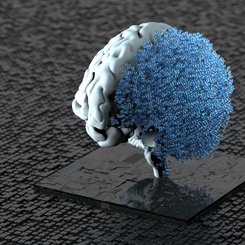After the invention of ChatGPT in 2022, chatbots based on Large Language Models (LLMs) have burst into our lives -- shaking established habits, challenging conventional wisdom about what AI is and can do, and raising new ethical questions. Like any breakthrough innovation, LLM-based chatbots open the door to multiple applications that may increase efficiency and productivity, but they also raise important ethical concerns. Dr. Radu Vranceanu, professor of economics and Referent of Scientific Integrity for ESSEC Business School, explains why we should be especially careful about when we use chatbots for research in economics and business administration.
Management and economics fall under the broad umbrella of the social sciences, which study human behavior in various dimensions, contexts and perspectives. Unlike the natural sciences, the social sciences often require long periods to confirm conceptual hypotheses and rely far less on controlled experiments (Calderon and Herrera, 2025). Written expression and language help to establish hypotheses and convince people of their validity. In this respect, the use of chatbots as “research assistants” raises additional ethical issues, particularly in relation to the attribution of ideas, solutions, results, etc.
Ethical Risks and Prudent Behavior
We already know that command of the English language has long been an important factor in the acceptance of papers by prestigious, mostly English-language journals. Good English improves the readability of a paper by conveying ideas clearly and directly. It also avoids offending the sensibilities of native English speakers, who make up a large share of academic referees and, like anyone, may unconsciously favor their own language.
One might go even further: if reviewers assume that native English-speaking scholars are, on average, better researchers, and if they struggle to evaluate increasingly complex papers, then strong English might act as a signal, indicating not just the authors’ origin, but indirectly, the (perceived) quality of their work. By narrowing the language gap, chatbots could increase the acceptance rate of papers written by non-native speakers.
In practice, several journal editors now recommend the use of chatbots to check and improve English, both before submission and during the revision process. Authors are often asked to disclose whether they used a chatbot-LLM, although no effective method currently exists to verify such claims. Many authors likely choose not to disclose their use. At first glance, this evolution might seem harmless. After all, what’s wrong with writing papers as polished as Robert Solow or Paul Samuelson?
The ethical risk lies elsewhere, in the possibility that the program alters the meaning of the text, even slightly, and departs from the initial thought of the author. Chatbot-LLMs generate sentences by minimizing the distance from a set of texts they were trained on. That training set is predetermined and may be influenced by groupthink or selection biases. Authors with a worse command of English, may be more influenced by the model’s suggestions, leading to stronger dilution of their intellectual ownership. Furthermore, the authors might inadvertently reproduce the would-be biases in the training set (Messeri and Crockett, 2024).
Furthermore, how can we distinguish between a scholar who used a chatbot to improve their English and one who relied on the machine to generate ideas? There’s a growing risk that, over time, any paper written with machine assistance could be challenged on the grounds of originality.
For this reason, Dr. Vranceanu suggests using LLMs only for narrowly defined tasks, such as the query, “Is my English correct?” but not for broader questions like “Is my paragraph clear enough?” The former is about form, and the latter involves content and interpretation.
Should we use LLMs to assist with literature reviews? Constructing a literature review is a sophisticated intellectual exercise that reflects the author’s personality, education and framing of the research from the outset. If one relies on a machine to generate an initial list of references, the research framework risks being shaped, perhaps narrowed, by the model’s conformist tendencies. Moreover, LLMs are often limited to papers from open-access sources, reducing the diversity and breadth of both their training data and search capabilities.
To address this conundrum, Dr. Vranceanu suggests using a chatbot to verify a literature review only at the final stage of a project, but not at the beginning of the research process. This can help ensure that no major works have been overlooked.
Chatbot-LLMs can be very useful for technical transformations, such as converting Stata output to LaTeX, or Word to LaTeX and so on. In this respect, they complement existing tools. It is perfectly acceptable to use a chatbot to find an error in a Stata or Maple routine. On the other hand, asking more advanced questions such as “Help me solve this econometric problem” or “Help me solve this complex mathematical problem” raises questions about the actual author of the work and tests the limits of his or her intellectual contribution. The least we can do is indicate that the solution to the complex problem was assisted by AI.
Dr. Vranceanu recommends that scholars in economics and management avoid using chatbots for fundamental idea generation. So far, even the most advanced systems perform poorly at this task, but things may change quickly. Still, the essential contribution of an academic paper is the founding idea: the research question, the puzzle, the enigma to be addressed. Delegating this task to a machine would relegate the human contribution to a marginal role, which is not in line with claiming intellectual ownership of the project.
One could argue that assistance with generating an abstract or title is a minor contribution and ethically acceptable. But once again, we must ask: how much of our intellectual identity are we willing to delegate to machines? Non-native English speakers (and even some native speakers) are driven to this kind of submission by their limited command of English. Perhaps this is inevitable, but if we can resist, even just a little, let us do so.
As Calderon and Herrera (2025) note, “for poorly prepared scientists or those outside science, the outputs of a chatbot will create a kind of illusory knowledge.” However, they also acknowledge that well-trained researchers may benefit from co-developing projects with the aid of chatbots. Messeri and Crockett (2024) are more radical, warning that “individuals who trust AI tools to overcome their own cognitive limitations become susceptible to illusions of understanding.”
To conclude this ethical reflection: it is better to err on the side of caution than to act out of curiosity, leniency or alleged higher productivity. The future is approaching fast, and practices now justified by enthusiasm for a “new research partner” may soon be questioned.
To preempt future criticism, authors should voluntarily disclose their use of LLMs in full, stating the brand and version of the software, and the query used. Editors should require this information and sanction noncompliance when it can be proven. There must be no statute of limitations on such disclosure.
From Ethical Concerns to a Sci-Fi Scenario
Now, let us move from ethics to a sci-fi scenario.
Today, millions of papers are published annually in the social sciences. Yet the number of truly relevant contributions, those that matter, may be counted in the hundreds, perhaps even fewer (Besancenot and Vranceanu, 2024). The “publish or perish” system has led to a proliferation of average-quality papers that few people read, but which are used to evaluate faculty, distribute bonuses, and grant promotions. Many papers are merely incremental extensions of other incremental papers. With the explosion of data availability, scholars increasingly race to find new correlations or minor effects, some guided by theory, others just by intuition.
A team of scholars (Tomino, Cooke, and Hoover, 2025) asked ChatGPT-4, currently among the most advanced chatbots, to write a paper on consumer behavior. Human intervention was only used when the chatbot got stuck. Unsurprisingly, the machine performed well on some tasks and poorly on others, especially subject generation. But the end result - about ethical fatigue - was far from ridiculous.
Now imagine repeating the same experiment five years from now, giving the chatbot a little topical guidance. It’s possible that in under five minutes, it could produce a polished text that would take a human six months to create today.
Just as human copy-editors are now vanishing, so too may this kind of “low-tech” research. By studying almost 45,000 articles in finance journals, researchers Thomas Walther and Marie Dutordoir have shown that researchers who intensively used ChatGPT to improve their text published more articles overall, but fewer articles in top-tier journals. At the end of the road, what will remain is advanced research: work that asks important questions, uses innovative methods, and is authored by the best-trained scholars. Many journals will disappear -- along with their editors, boards, and large profits for main publishing houses. Social science may return to its roots, where quality prevailed over quantity. Scholars now engaged in low-tech publishing may rediscover the joys of teaching complex ideas and engaging in lively classroom discussions, something machines cannot (yet) replicate.
Or perhaps this will not be the case. Human editors may be replaced by machine editors. Millions of chatbot-generated articles may be published in chatbot-managed journals and read exclusively by chatbots themselves, and be used to generate further papers, while humans will watch their favorite TV series.
Perhaps we should ask our favorite chatbot what it thinks.
References
-
Besancenot, Damien, and Radu Vranceanu (2024). "Reluctance to pursue breakthrough research: A signaling explanation." Research Policy 53.4: 104974.
-
Calderon, Reyes, and Francisco Herrera (2025). "And Plato met ChatGPT: an ethical reflection on the use of chatbots in scientific research writing, with a particular focus on the social sciences." Humanities and Social Sciences Communications 12.1: 1-13.
-
Messeri, Lisa, and M. J. Crockett (2024). "Artificial intelligence and illusions of understanding in scientific research." Nature 627. 8002: 49-58.
-
Tomaino, Geoff, Alan DJ Cooke, and Jim Hoover (2025). "AI and the advent of the cyborg behavioral scientist." Journal of Consumer Psychology 35.2: 297-315.
-
Walther, Thomas and Dutordoir, Marie, 2025. Certainly! Generative AI and its Impact on Academic Writing (in Finance). Available at SSRN:https://ssrn.com/abstract=5317993









